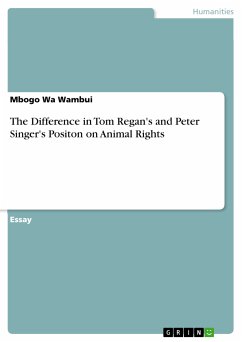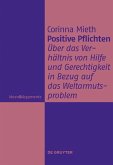Essay from the year 2013 in the subject Philosophy - Philosophy of the 20th century, grade: 0.7, University of Nairobi, course: Environmental Ethics, language: English, abstract: This paper discusses and contrasts the positions for and against the use of animals for the advancement of science. Moreover, the paper questions how right the use of animals is and whether we should be bothered by their sentiency. The issue of animal rights begins with the question of what sort of beings are deserving of moral regard. Do we only treat human beings or include animals as well? It also begs the question, how are we supposed to treat animals? Do they have moral rights? When animals suffer, can we equate it to human suffering? Should we ban both experimentation on animals and large scale commercial farming of animal? What is the moral status of animals? Do we have a moral obligation to become vegetarians instead of eating animals? Peter Singer in 1975 wrote a book Animal Liberation which launched the animal rights movement. It was and is a call for an end to human tyranny towards animals. It was a call to end the pain and suffering of animals. In fact, Peter Singer likened the tyranny on animals with that of white humans over black humans. Peter Singer position today is classified as utilization following on Jeremy Bentham's agreement for sentiency as the bar we should use to measure morality as opposed to reason. The argument runs as follows. Since all sentient beings have the ability to suffer, it follows that they have interests. And since they have interests, when these are frustrated, it leads to suffering. Being a utilitarian, Singer's position is one that seeks to maximize satisfaction of interests whether they are of humans or animals. What about Tom Regan's position? Tom Regan on the other hand adopts a deontological rights position which is the view that animals, like men are "ends in themselves" and therefore ought not to be exploited. Animals and humans have equal rights. In fact, to Regan, animals have similar essential properties like humans with regards to desires, memories, and intelligence and so on and this therefore gives them equal intrinsic value like humans. Regan is more radical than Singer. Why? He calls for the total end to commercial animal farming, all hunting and trapping of animals, all animals' experimentation even eating of animals. This article discusses and contrasts the positions taken by these eminent scholars.
Dieser Download kann aus rechtlichen Gründen nur mit Rechnungsadresse in A, B, BG, CY, CZ, D, DK, EW, E, FIN, F, GR, HR, H, IRL, I, LT, L, LR, M, NL, PL, P, R, S, SLO, SK ausgeliefert werden.









